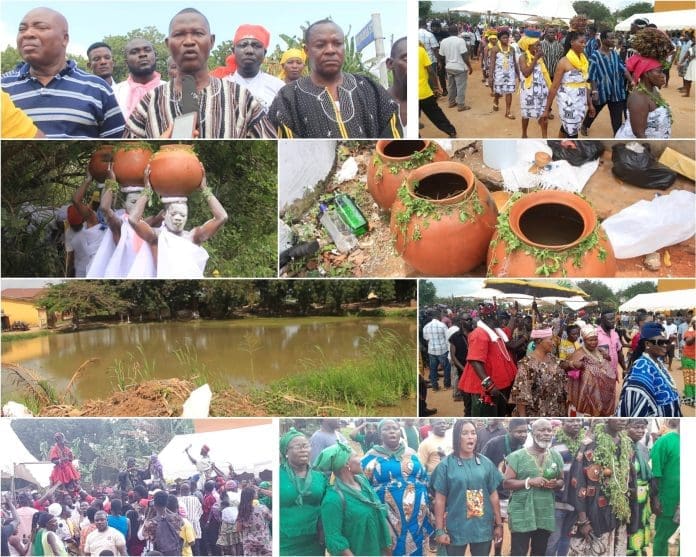The 2025 ‘Yele Yeli’ (Yam Eating) Festival, celebrated under the theme “Unity and Development,” culminated in a vibrant and deeply successful grand finale on Friday, September 27, 2025. The community of Oyibi came together to celebrate their heritage, marking the end of a week-long cultural observance with a massive gathering, rich in tradition and a renewed sense of shared purpose.
Chief Bans Unauthorised Fishing in Bokor River
In a move aimed at protecting the area’s natural resources, Nii Boye Okanshan VI, the Oyibi Mantse, issued a directive banning the casting of nets into the Bokor River. He emphasised that the river must be preserved to serve the entire community.
“Henceforth anyone seen casting a net into the Bokor River without the permission of the Chief will face severe punishment,” Nii Boye Okanshan VI stressed.
The Chief also used the platform to dispel rumours of instability, assuring the community of the festival’s certainty. “Oyibi is peaceful and plans and preparations for the 2025 Oyibi Yele Yeli have been advanced,” he affirmed, urging community members to come out in large numbers to celebrate in continued peace and harmony.
The Heart of Yele Yeli: Votoli and Sacred Rivers
The annual Yele Yeli festival is celebrated every September to honour the ancestors, who were predominantly farmers. A central activity of the festival is the preparation of a unique staple food called votoli, which is made from yam and palm oil.
Significantly, the only water permitted for the preparation of this sacred meal is sourced from the Naa Onukpa Abu River. Nii Bortei, the Oyibi Seintse, explained to the press that the stream was named after one of Oyibi’s ancestors, Naa Onukpa Abu.
“Votoli is the staple food of our mother Naa Onukpa Abu and hence the staple food of the members of the Oyibi community,” Nii Bortei stated. It is widely believed that consuming votoli brings blessings, good health, and even marital luck.
The traditional leader expressed his fervent hope: “It’s our fervent prayer that the river doesn’t get dried up but rather flows throughout.” He concluded by thanking God Almighty, Nii Boye Okanshan VI, ancestors, elders, and the entire Oyibi community for their support in making the festival a success.
Ancestral Rites and Modern Conflicts
The festival’s major activities include the planting of yam, cultivating of yam and other produce, and the cutting of Tsiame Tso.
Farmers also gather their tools and produce along the Bokor River to offer thanks to God and the ancestors at a sacred place called “Ashiele Na.” This ritual is performed to express gratitude for protection throughout the farming year, especially from wild animals.
However, Nii Boye Okanshan VI highlighted a concerning deviation from tradition regarding fishing. While the forefathers would undertake fishing and share the catch among the entire community, he noted that “in modern times just some few individuals often undertakes the fishing and sell the catch without the community members.” The Chief lamented that despite reporting the activities of these individuals to the police on several occasions, no resolution has been achieved.
He therefore seized the opportunity to sound a stern warning to those involved in the illegal fishing activity in the bokor river should stop immediately or face the rough of the traditional leaders.
By Kingsley Asiedu
Source: newsghana.com.gh











